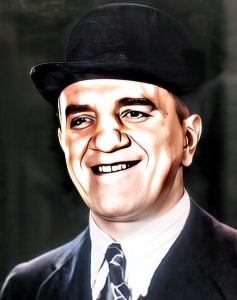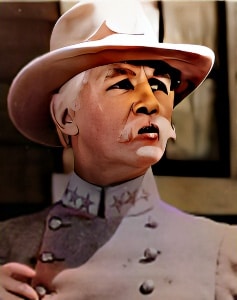 Louis Wolheim, born on March 28, 1880, was a prominent American actor best known for his contributions to both silent and sound films during the early 20th century.
Louis Wolheim, born on March 28, 1880, was a prominent American actor best known for his contributions to both silent and sound films during the early 20th century.
His distinctive appearance, strong presence, and versatility as an actor made him a memorable figure in the world of entertainment.
Wolheim began his career in a vastly different field, working as a teacher and a mining engineer. However, he eventually decided to pursue his passion for the arts, enrolling at the American Academy of Dramatic Arts in New York City. This career shift marked the beginning of his journey in the world of theater and, later, film.
Louis Wolheim’s noteworthy career in both silent and sound films included his participation in the 1923 silent film “ Little Old New York.” Directed by Sidney Olcott and based on a play by Rida Johnson Young, the film transported audiences to the early 19th-century New York City.
One of the highlights of Louis Wolheim’s career was his transition to the world of silent film. His unique appearance, often characterized by a bald head and heavyset frame, allowed him to stand out and secure roles that showcased his distinct features. His breakthrough came when he portrayed the brutal but memorable prison guard in the 1930 film “The Big House.” The film’s success catapulted Wolheim to fame, earning him an Academy Award nomination for Best Actor.
Wolheim’s talent as a character actor was evident in his ability to portray a wide range of roles, from villains to sympathetic characters. His performances resonated with audiences, and his commanding presence on screen left an indelible mark on the early days of Hollywood.
As the film industry transitioned from silent to sound films in the late 1920s and early 1930s, Wolheim adapted to the changing landscape. His distinctive voice and acting skills allowed him to seamlessly continue his career in sound cinema, where he took on various roles, contributing to the rich tapestry of the era’s filmography.
While Louis Wolheim may not be as widely remembered today as some of the leading actors of his time, his contributions to early American cinema are celebrated. His unique appearance and the depth of his performances added to the growing reputation of American cinema as a significant form of artistic expression. He was known for his ability to convey complex characters and emotions on screen.
Louis Wolheim’s presence in silent and sound films enriched the historical tapestry of early Hollywood, and his legacy endures as a testament to the talent, adaptability, and lasting influence of actors from the early days of American cinema. His career showcased the enduring impact of character actors who could seamlessly transition between silent and sound films, making their mark during a transformative era in the history of cinema.
In conclusion, Louis Wolheim’s career serves as a reminder of the lasting contributions of character actors in the early days of Hollywood. His work in both silent and sound films exemplified his versatility and ability to convey complex characters on screen. While he may not be a household name today, his legacy endures as a testament to the talent, adaptability, and enduring influence of actors who left their mark during a pivotal period in the history of American cinema. Wolheim’s unique presence and memorable performances remain an integral part of the rich history of early Hollywood.
Loading live eBay listings...




